Community organization
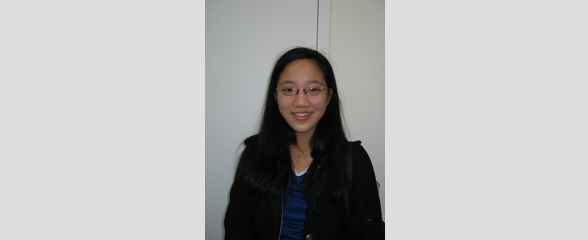
2008.040.002 Oral History Interview with Jenny Ye February 2, 2008
Jenny Ye was born in Manhattan in 1991, and has been a resident of Chinatown her whole life. She actively volunteers and coordinates for community-oriented organizations such as Chinatown Youth Initiatives, Committee Against Anti-Asian Violence (CAAAV), Chinatown Literacy Project, and Asian Pacific American Youth Alliance (APAYA). Ye first became aware of gentrification at a Chinatown Tenant Union meeting. She visualizes Chinatown as having aged low-rise buildings, fire escapes, no elevators, and inhabited by mostly immigrant families. When asked to define gentrification, she envisions tall buildings, the process of uprooting low-income communities and shifting them elsewhere to give privilege to more affluent residents who are able to afford the renovated real estate. Ye argues that gentrification does not solve issues with safety, crime, sanitation, and poverty because it merely relocates it to another neighborhood. However, she also empathizes with landlords because her parents, who have investments in real estate, rely on gentrification and the ability to raise rent in order to sustain the family’s quality of life. Finally, Ye talks about the changes in Chinatown, claiming that it is now shrinking, and explains that the changes occurred without consideration for the neighborhood’s businesses and residents; in other words, she fears that gentrification will transform Chinatown into “South SoHoâ€.
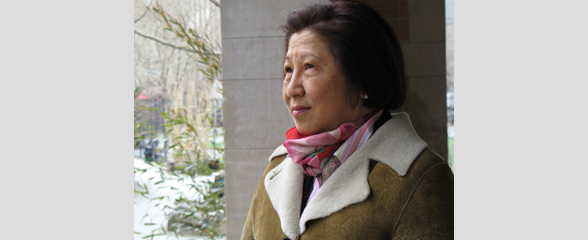
2008.040.022 Oral History Interview with Spring Wang September 8, 2008
Spring Wang is an independent developer who was born in China and raised in Taiwan. In this oral history, she discusses her experience of moving to the United States in 1968, where she attended college and became a Marxist heavily involved in political and social movements. One organization with which she associates herself is Asian Americans for Equality (AAFE), a group devoted to talking about social services, equal employment opportunities, and housing development. She reflects on her experience in New York’s Chinatown, paying particular attention to the infrastructure and ongoing development that trickles into Soho, the Lower East Side, and Tribeca.
Events like September 11th and the global economic crisis come into play when Wang analyzes the demographic shifts in the community. According to Wang, new Chinese immigrants are more self-confident and forward-looking in contrast to earlier immigrants. She believes that because Chinatown is a small area, the institutions or physical aspect of the neighborhood is more essential than the residential population to the survival of Chinatown. She proposes that Chinatown builds larger institutions, advocating for the creation of places with more cultural spirit and symbolic significance to act as a “magnet†for the people.
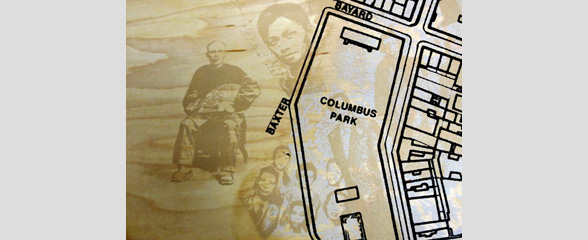
2008.040.023 Oral History Interview with Toby Turkel March 28, 2008
Toby Turkel is a Jewish woman who was born and raised in East New York, Brooklyn, and moved to Chinatown in the mid-seventies. She is an active community member, serving as the president of Chatham Towers, a co-op in Chinatown, as well as the vice president of Synagogue for the Arts. During this oral history, she begins by discussing her childhood in East New York and her personal journey that led her to live independently on the Lower East Side beginning in the sixties. Turkel later got married and moved into Chatham Towers, an apartment building located in Chinatown and predominantly inhabited by Asians. She explains how her relationship with the Chinatown community has grown over time and how she feels privileged to experience its unique culture, affectionately describing the area as “gritty†and down to earth. She also reflects on her unusual circumstance of being a non-Chinese resident of the neighborhood.
Turkel goes on to describe some of the issues affecting the Chinatown neighborhood that arise during the Chatham Tower board meetings, such as placard parking, congestion pricing, the proposed reconfiguration of Chatham Square, and the “Chinatown arch.†She also discusses the pros and cons of a proposed Chinatown Business Improvement District [BID], which would assess businesses and buildings and collect funds from landlords for community improvement. Although she recognizes there are some positive outcomes of gentrification, Turkel rejects changes that would threaten the fundamental character and distinctness of the Chinatown neighborhood.
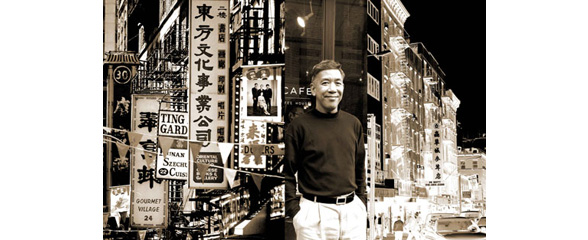
2013.022.004 Oral History Interview with Henry Chang
Henry Chang is a detective novel author and was born and raised in New York City Chinatown. In this oral history he shares a background of his family history along with when he came to Chinatown. Chang was involved in the creation of Yellow Pearl along with the civil rights movement. Chang discusses the significance Yellow Pearl has on his life along with a poem he wrote for the publication. He recounts on the ways he documented the history of Chinatown and the process of putting this history into his books. Lastly, he discusses the ways Chinatown is changing along with his favorite restaurant Grandpas.
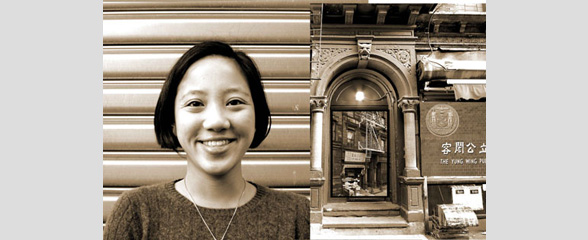
2013.022.005 Oral History Interview with Jenny Ye
Jenny Ye is a college student at Harvard University and spent her childhood in Chinatown. In this oral history Ye focuses on her childhood and experiences attending public schools in the New York City Chinatown area. She recounts spending time with her family and her cousins and growing up in Chinatown. Ye attended PS 124 and shares her autograph book as she recounts fond memories during elementary school. She also discusses her time in middle and high school with her involvement in CCAV and the Chinatown Youth initiatives groups. She reflects on how Chinatown has changed with the progression of gentrification. The interview concludes with a deeper discussion of her time at PS 124 and the TVB video rental store.
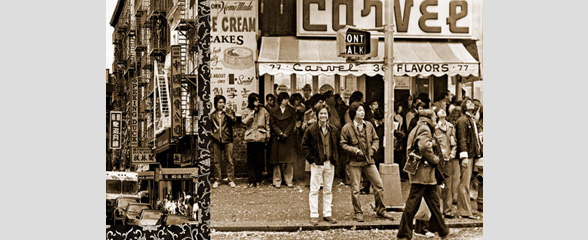
2013.022.009 Oral History Interview with Wing Lee
Tomie Arai and Janice Lau sit down with Wing Lee to discuss his life and his experience growing up in and around New York Citys Chinatown in the 60s through the 80s. Wing talks about what it was like as a kid being raised in the US with Chinese parents, and growing up on the streets of Chinatown. He talks about the schools he went to in the area, and all the spots the neighborhood kids used to hang out. Later on in his late teenage years, he describes the experience at a popular neighborhood bar called Grandpas. Wing describes the atmosphere at Grandpas, the regulars there, and how he was eventually asked to design a t-shirt for the bar as well as a large mirror to hang in the space. He touches on the gang presence in Chinatown in the 70s, and describes the changes he has seen in the neighborhood since his youth. He feels hopeful for the future of Chinatown and believes that the quality of life has improved for your average Chinatown resident. He is excited that the area is now taken seriously politically and that Chinatown has Asian and Chinese representation within the city government. Wing is an artist, and he is excited to see the museum documenting this important community history.
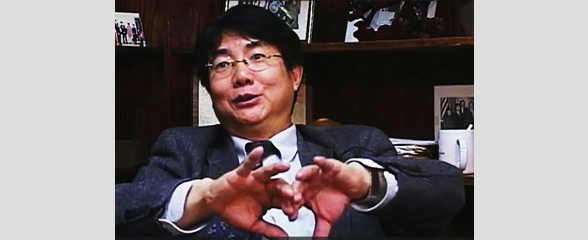
2014.036.014 Oral History Interview with David Chen July 10, 2003
During the interview, David Chen discusses his experience as a Chinese American activist and director of the Chinese-American Planning Council (CPC), and his theory of activism. When Chen was younger, he rarely spoke. He would always wait for someone else to say the right thing, to which he would then agree. One time, as a younger student, he was forced to present a project because two of his partners did not show up. One of his classmates expressed how well-spoken he was and at that moment, Chen realized that his voice could be heard. Chen believes that in order to be an activist for peace and justice, one must see the bigger picture. Effective activism should start with institutions because that is how change can be enacted. He believes that anyone can be an activist as long as they talk, remember, observe, and are skeptical of organizations. He states that while spontaneous change comes from the bottom, sustaining change comes from the top, more specifically, from organizations. Chen joined the Organization of Chinese Americans in order to advocate for what he wanted to stand for and speak freely on those subjects. However, he also believes that a successful organizer does not talk too much because activism is about observing the smaller issues. As an activist, he believes that trust must be gained from individuals. Chen agrees that the Asian American rights movement was inspired by the Civil Rights Movement. Overall, he believes that society as a whole has become more willing to change and hopes that individuals, especially young activists, continue to act, give voice, and intellectualize.
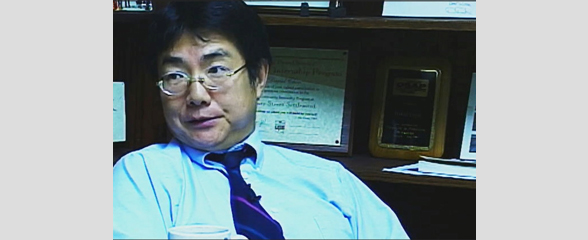
2014.036.015 Oral History Interview with David Chen July 13, 2004
In this interview, David Chen discusses his work at Chinese-American Planning Council (CPC) as an activist in New York City Chinatown. Chen is the director of CPC, a private organization started in 1965 serving the public and focusing on low-income immigrant families, mostly Chinese. Services offered include language classes, translations, daycare centers, job training for adults, senior citizen care, childcare, and Meals on Wheels. Prior to his work at CPC, Chen worked for the mayor in Chicago. While there, he constantly questioned why there was no Chinese funding. While in college, Chen studied to be a social worker and community organizer. He explains that he was not good at chemistry and did not want to pursue medicine or law like his parents expected him to. During college, he and his friends volunteered in Chicago Chinatown, which is much smaller than New York City. In Chicago Chinatown, Chen and his friends taught English classes but there were not many job opportunities in the community, so he decided to work for the government. On a visit to New York City, Chen fell in love with how densely populated and large Chinatown was and was told that there were many job opportunities available. He applied for a position at CPC as a youth director twenty-three years ago, accepted the role, and moved to New York City. Chen was part of "Project Reach", which was an at-risk prevention program for troubled kids. He describes Chinatown as a transient neighborhood in that there is constantly an influx of Chinese immigrants every few years. CPC serves those immigrants by helping them get entry-level jobs and helping them get their foot in the door. By doing so, he hopes that secure immigrants who have gotten aid from CPC would be able to help the next wave. Asked about his upbringing, Chen shares that he is from an upper-middle class family and that his father was an engineer. He was originally born in Shanghai but his family moved to Hong Kong while he was a baby. He came alone to the United States during his final year of high school and focused on school in order to avoid being drafted into the Vietnam War. The last part of the interview briefly covers 9/11. Chen notes that in the recovery and aftermath, Chinatown was largely ignored although it was an adjacent neighborhood to the World Trade Center. Chen also describes how important Chinatown is to tourism because of its restaurants and shopping venues.

2014.036.015 Oral History Interview with David Chen July 13, 2004
In this interview, David Chen discusses his work at Chinese-American Planning Council (CPC) as an activist in New York City Chinatown. Chen is the director of CPC, a private organization started in 1965 serving the public and focusing on low-income immigrant families, mostly Chinese. Services offered include language classes, translations, daycare centers, job training for adults, senior citizen care, childcare, and Meals on Wheels. Prior to his work at CPC, Chen worked for the mayor in Chicago. While there, he constantly questioned why there was no Chinese funding. While in college, Chen studied to be a social worker and community organizer. He explains that he was not good at chemistry and did not want to pursue medicine or law like his parents expected him to. During college, he and his friends volunteered in Chicago Chinatown, which is much smaller than New York City. In Chicago Chinatown, Chen and his friends taught English classes but there were not many job opportunities in the community, so he decided to work for the government. On a visit to New York City, Chen fell in love with how densely populated and large Chinatown was and was told that there were many job opportunities available. He applied for a position at CPC as a youth director twenty-three years ago, accepted the role, and moved to New York City. Chen was part of "Project Reach", which was an at-risk prevention program for troubled kids. He describes Chinatown as a transient neighborhood in that there is constantly an influx of Chinese immigrants every few years. CPC serves those immigrants by helping them get entry-level jobs and helping them get their foot in the door. By doing so, he hopes that secure immigrants who have gotten aid from CPC would be able to help the next wave. Asked about his upbringing, Chen shares that he is from an upper-middle class family and that his father was an engineer. He was originally born in Shanghai but his family moved to Hong Kong while he was a baby. He came alone to the United States during his final year of high school and focused on school in order to avoid being drafted into the Vietnam War. The last part of the interview briefly covers 9/11. Chen notes that in the recovery and aftermath, Chinatown was largely ignored although it was an adjacent neighborhood to the World Trade Center. Chen also describes how important Chinatown is to tourism because of its restaurants and shopping venues.